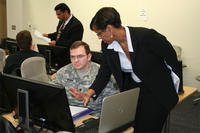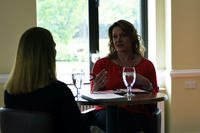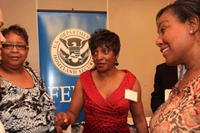As soon as Navy wife Holly heard the news that her husband had PCS orders, she immediately started planning for the move. She was looking forward to moving from the small Navy base in Japan to the much larger Hampton Roads area for many reasons-- one of which was the increased chances of finding a job.
During the three years Holly lived OCONUS, she was unable to find a paying job, but she spent much of her time volunteering. As she considered the prospect of returning to the workforce after a three year absence, she wondered how she could use that volunteer work to her advantage. So she turned to the experts.
Related: Does your resume pass the 6-second test? Get a FREE assessment.
“I didn’t know I could use my volunteer experience on my resume,” Holly says. “But after calling the Fleet and Family Support Center on base, I learned that not only could I use it, but they would help me do it.”
Navy Spouse Employment Resources
The first place Navy spouses should call when seeking employment is the Fleet and Family Support Center or FFSC. The FFSC offers a wide variety of free programs and services for Navy servicemembers and their families, including resources for military spouse employment.
One of the programs offered by FFSC is the Family Employment Readiness Program (FERP), which walks spouses through the entire job search process, starting from the very first step of figuring out what career path you’d like to follow all the way to negotiating benefits. Regardless of where you are in your career journey, whether you’re going back to work after being a stay-at-home parent or trying to maintain a career following a PCS move, the FERP can help point you in the right direction.
Through the Family Employment Readiness Program, spouses can sign up for workshops that address employment-related issues such as career planning, launching a job search, resume writing, interview techniques and federal employment information.
Related: For the latest veteran jobs postings around the country, visit the Military.com Job Search section.
If you’re at the beginning stages of the employment process and you’re not quite sure what kind of job you’re looking for or if you’re considering a career change, start with the career planning workshop.
If you know the direction you’d like to go and you’re ready to start applying for jobs, you can skip to the workshops centered on writing your resume and building your interview skills.
Although you don’t have to attend all the workshops, the more information you can collect about employment, the better. It can’t hurt to sign up for them all!
Specific workshops, times and frequency vary from base to base, so call your local Center for more details. Some bases offer services that others don’t. For instance, the Naval Air Station Oceana FFSC offers all of their workshops once a month within a one-week period. Following each resume writing workshop, they hold an employer panel, which is a one-hour question and answer session with representatives from different companies.
According to Megumi Fuda, an Employment Educator at the NAS Oceana FFSC, the panel gives spouses a chance to ask human resource professionals questions about things like job openings, benefits offered and tuition assistance.
In addition to workshops, FERP provides individual assistance through one-on-one employment counseling. If you aren’t able to attend a workshop or you’re more comfortable learning outside a classroom setting, you can set up an appointment to speak with a consultant in a 60 to 90 minute session. Anything covered in a workshop can be discussed in these individual sessions.
The helpful staff offers assistance for all levels of employment for whatever job you may be interested in pursuing, including self-employment and volunteer opportunities. Don’t forget that volunteering is a great way to build experience, learn new skills and make important connections that could potentially lead to job opportunities. And as Holly learned, volunteer experiences are also excellent additions to resumes.
Although not all FFSCs have a private office space for spouses, they do have Career Development Resource Centers (CDRC) stocked with computers, printers and copy machines that spouses can use in their job search. The number of available computers varies depending on the specific Center.
At the CDRC you will also find resources and websites that list available jobs in the area, including jobs on base, as well as information on job fairs both locally and throughout the country for military spouses. These job fairs allow spouses to interact with a number of employers representing a variety of career fields.
Before heading out to a job fair, it’s best to attend the workshops or speak with a consultant one-on-one. That way you can walk into the job fair already armed with your resume in hand and interview tips fresh in your mind when you shake hands with potential employers.
There are also job opportunities available on Navy bases. Spouses interested in on-base employment are referred to Non-Appropriated Fund (NAF) personnel. NAF positions include Morale, Welfare and Recreation (MWR), Child Development Centers, and Navy Gateway Inns and Suites. Spouses can call or go to the Navy Exchange to inquire about their job openings.
The FFSC recommends that spouses also use the Military Spouse Employment Program (MSEP) online. MSEP, which has several hundred partners, is a way for spouses to gain direct access to actively recruiting employers.
After squaring away her resume with the help of a Fleet and Family Support Center consultant, Holly moved to Virginia Beach and quickly found herself with a new job that utilized all the skills she picked up as a volunteer.
“Thanks to the FFSC, I had a great resume that helped me get a job I love,” beams Holly. “If you have any questions whatsoever about finding a job, FFSC knows the answer.”
Looking for more job tips?
Sign up for a free Military.com membership to have military news, updates and job resources delivered directly to your inbox.
























